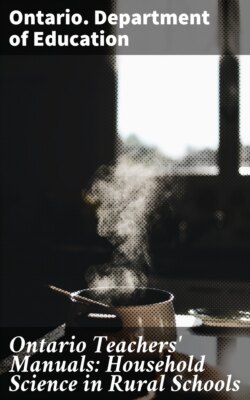Читать книгу Ontario Teachers' Manuals: Household Science in Rural Schools - Ontario. Department of Education - Страница 6
На сайте Литреса книга снята с продажи.
INTRODUCTION
ОглавлениеThe three brief courses in home-making outlined in this Manual have been especially prepared for use in elementary rural schools. They are in no sense complete outlines of the subjects with which they deal; rather, they indicate a few of the important phases of food study, sewing, and the care of the home with which the pupil in the elementary school should become familiar. The underlying thought for each problem should be: "Will this help the pupils to live more useful lives, and will it lead to better conditions in their homes?"
The lessons are purposely made simple, and the plans are definitely outlined, so that even the inexperienced teacher may be able to achieve a certain measure of success. The experienced teacher will find in them suggestions that may be of value in the further development of the course.
The teacher who desires to use this course will necessarily have to adapt it to her own community, and it is hoped that she may be able to do this with but little alteration. While conditions of living and choice of foods differ in various parts of the Province, the general principles of nutrition, the rules of sanitation, and the methods of cooking and serving are much the same for all.
Owing to the difficulty of securing time on the programme for frequent lessons in home-making, each of the courses has been limited to twenty lessons. Some teachers may not be able to have a greater number of lessons during the school year, and they may find it well to carry the three courses through three successive years. In other schools, where more frequent lessons can be given, it may be well to offer all three courses during one year. The courses in cooking and the care of the home can be advantageously combined, as many of the problems in both are related. The lessons in sewing may be given on another day of the week, or it may be well to give them early in the year, to be followed, later, by the cooking lessons. Thus an opportunity will be furnished for the making of the cooking aprons and the hemming of the towels.
It is most desirable that periods of at least forty minutes should be provided for all the practical lessons. Longer periods will be necessary for some of them, such as the preparation and the serving of a meal. If no practical work is undertaken in the lesson, a forty-minute period is sufficient.
